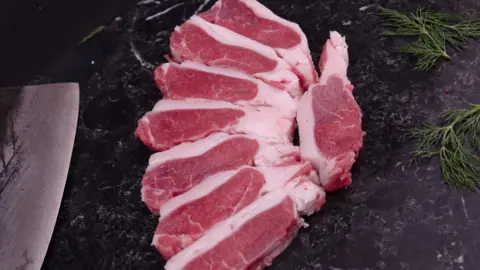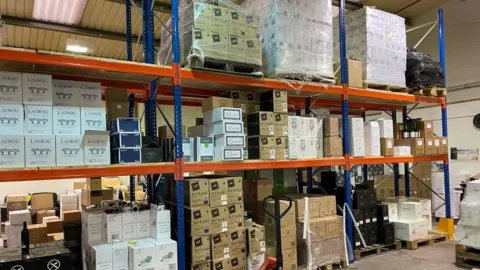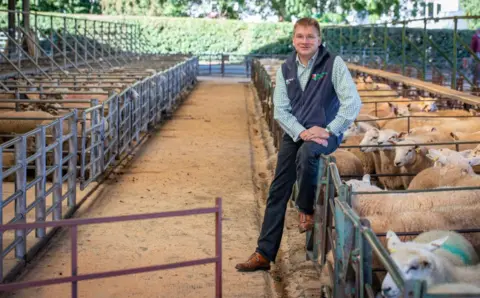Brexit: Lamb exporter to EU 'making virtually nothing'
 Getty Images
Getty ImagesOne of Wales' largest lamb exporters says the extra cost and paperwork of selling meat into the EU means it is making "virtually nothing".
Meat processing plant Randall Parker Foods in Llanidloes, Powys, warned it may lose a third of its 150 workers unless new border controls change.
The company processes one million lambs a year, half of which are exported to the European Union.
The UK government said they are working to help exporters with the new rules.
Randall Parker Food's general manager Dale Williams said the UK's new post-Brexit trading relationship with the EU "means extra cost, tying someone up all day to do the paperwork for one vehicle".
"If there's multiple products it can take hours per product because we have to send the documents off to be verified before we can release the vehicle to go on its journey," he said.
"As it stands today we're operating for virtually nothing. We're doing it for the sake of keeping the doors open at the moment."
Some staff have already been furloughed and Mr Williams fears he could lose a third of his business "which will make the company seriously unviable".
"If the export paperwork and documentation and controls either side of the border continue, I think we will have to make redundancies," he said.
Freight costs
 Daniel Lambert
Daniel LambertFor importers there are big changes too - like Daniel Lambert, who imports wines from the EU for the company he runs in Bridgend.
He said it has taken him 20 days to get the declaration he needs so the wine producers he buys from can begin the process of sending over his purchases.
He was a supporter of the UK remaining in the EU, but said: "This isn't about Brexit, this isn't about a desire for the EU.
"This is about the UK government getting its act together and getting a system that is easy to use, that the layperson can look at, because otherwise you're going to have to use customs brokers for everything and that's just going to put unnecessary costs on by the import and export.
"It's not good for the consumer, and it's raising prices when they don't need to rise."
Mr Lambert added that his freight costs had nearly doubled because of the price importers have to pay for customs declarations.
Consignments of goods can also be delayed if other businesses using the same haulier have not produced the correct paperwork.
Mr Lambert said other problems at ports because of Covid-19 and stockpiling were exacerbating the situation, which he said was more than teething problems.

- NEED LOCKDOWN ENTERTAINMENT INSPIRATION?: A plethora of comedy at your fingertips
- JOIN THE HUNT FOR SOME OF WALES MOST NOTORIOUS KILLERS: Binge watch Dark Land: Hunting the Killers

'Reams of paperwork'
 Tim Jones
Tim JonesFarmers Fresh - a co-operative of 2,700 farmers which has a plant in Wrexham - has been exporting to the EU for 20 years.
Three-quarters of the one million sheep they process are for EU customers - and director Mike Gooding said trading with the EU was now like "being a salmon swimming up river".
"It's not helped because the rules and regulations are not clear and there is inconsistent interpretations of those rules," he said.
Mr Gooding added there was strong demand for Welsh lamb in Europe but problems now are "a result of interfering with a system that was working fine and imposing on it a system that is not fit for purpose".
He said that his company has looked at new markets around the world, but in most cases New Zealand is already exporting lamb there.
"Simply turning up and waving our flag and trying to establish our credentials is not a guaranteeing trade in other parts of the world," Mr Gooding said.
"We are dealing with reams and reams of paperwork. The electronic systems, the databases need to be properly installed and properly defined."
The UK Government acknowledged they are "aware of a small number of issues" since 1 January but added "overall businesses are adjusting well" to the new rules and said trade "continues to flow smoothly".
"Our agri-food industry is vital, and we want to help businesses take advantage of the opportunities that lie ahead," the UK Government spokesperson said.
"We are working closely with exporters to help them understand the new requirements."
